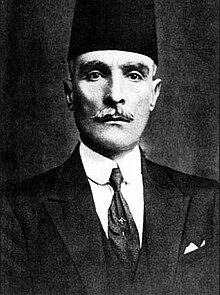Ibrahim Hananu
Ibrahim Hananu ( Arabic إبراهيم هنانو, DMG Ibrāhīm Hanānū ; * 1869 ; † November 21, 1935 ) was the founder of the Syrian National Bloc .
The son of Kurdish landowners was born in Kafr Takharim west of Aleppo and grew up in Aleppo. He studied in Aleppo and Constantinople . There he joined the Committee on Unity and Progress as a student .
After graduating, he briefly taught at the military academy. When the Arab uprising broke out in 1916 , Hananu joined the Arab army under Faisal I and entered Aleppo with the Allies in 1918.
When the French army landed on the Syrian coast in autumn 1919 and was preparing to occupy all of Syria, Hananu started a revolt. He was responsible for the disarmament of numerous French units and the destruction of railways and telegraph lines. He received help from the Turkish nationalist movement under Mustafa Kemal Ataturk . Hananus and a few other revolts eventually resulted in a general uprising against the French occupation of the new Syrian nation-state in 1925. The National Bloc was founded in 1928 after the armed resistance had been put down and the aim was to achieve independence through diplomatic channels. In 1928, under Hananu's leadership, the first republican constitution for Syria was discussed and adopted. In the 1930s, he affirmed his reputation as a hardliner and refused to negotiate with the French until they pledged complete and unconditional independence for Syria.
Hananu died in Aleppo in 1935. To this day he is considered one of the most famous fighters of the resistance against the French mandate . After his death, Hananu's house in Aleppo was used by Syrian nationalists as the "home of the people".
Individual evidence
- ↑ Keith David Watenpaugh, Being Modern in the Middle East, Princeton University Press, Princeton and Oxford, 2006, pp. 174-184.
- ↑ Sami M. Moubayed: Steel & Silk: Men and Women who Shaped Syria 1900-2000. Cune Press, Seattle 2006, p. 377
- ^ Philip Khoury, Syria and the French Mandate, Princeton University Press, Princeton, 1987.
| personal data | |
|---|---|
| SURNAME | Hananu, Ibrahim |
| ALTERNATIVE NAMES | إبراهيم هنانو |
| BRIEF DESCRIPTION | Founder of the Syrian National Bloc |
| DATE OF BIRTH | 1869 |
| DATE OF DEATH | November 21, 1935 |
